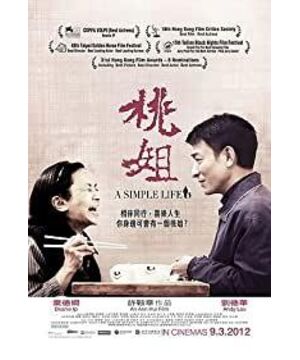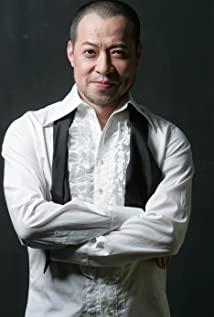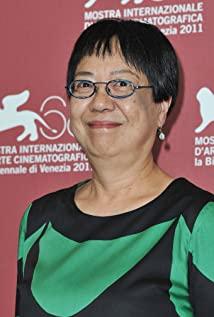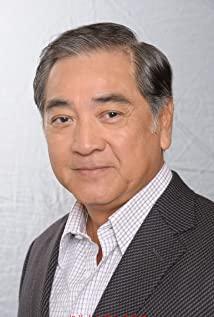As said in the autobiographical film [Guestu Qiuhen], Xu Anhua lived with his grandparents since he was a child. Because his mother was Japanese, he had always been estranged from the relationship. Later, he went abroad to study early and entered the male-dominated TV circle after returning to China. , directly instigated the main role with a single-sided attitude, and soon her father passed away, and the heavy responsibility of supporting the family fell on her. Perhaps it is this kind of independence forced from childhood that allows Xu Anhua to break away from women's habitual lingering feelings of love between men and women and blood relatives, and to view the relationship between people from a broader and calmer perspective. . Therefore, Xu Anhua's passion for human relationships is often detached from family, friendship, and love, just like the master-servant relationship between Roger and Sister Tao in [Sister Tao]. Let's call it Xu Anhua's fourth type of emotion. This is an emotion that only asks for sacrifices and no return. It is the most innocent and warm part of human nature. vast.
More than love
, Xu Anhua has said many times that he does not understand love very well, "I saw romantic love when I was young and young, and it was not realistic. And my love experience is not as romantic as in the book, so Usually I'm very disappointed." She said that her view of love is very "naive" and "old-fashioned", so this unmarried woman has hardly made any pure love movies, even when it comes to love. Pessimistic brushstrokes, and more often, she puts her focus on love.
[The Story of Hu Yue] At the beginning, Hu Yue smuggled into Hong Kong, China from Vietnam. Li Lijun, a pen pal who had never met before, received his previous letter and waited outside the barbed wire fence at the immigration office every day. As a social worker who teaches criminals to follow the rules and be kind on weekdays, Li Lijun helped Hu Yue get a fake passport because he violated his professional ethics. This simple girl has never said a word of "love" to Hu Yue, but her gestures and brows show her unspeakable sincerity. When he saw Shen Qing appear, although he was jealous, he still gave Hu Yue a sum of money, and then turned and left. She never asked for anything from Hu Yue, just pure protection. That kind of innocence was more sentimental than the rivalry between Hu Yue and Shen Qing.
Li Lijun is a bit like Huo Qingtong in [Books and Swords] and [Princess Xiangxiang]. The beloved Chen Jialuo empathizes with Princess Xiangxiang, but she has been fooled by fate and still has no complaints. On the contrary, she is a heartless man. Pray with my sister and save them from distress. Similarly, Chen Wenjing in "Men Forty" fell in love with a Chinese teacher in middle school, and then became pregnant and was rejected. But 20 years later, when she learned that the teacher was terminally ill, she still decided to accompany him on the final journey, ignoring how she had carried the pain through these 20 years. Without deep compassion in their hearts, neither Huo Qingtong nor Chen Wenjing could be tolerant and open-minded.
Even more unbearable is Lin Yaoguo, who accompanied Wen Jing to have an abortion 20 years ago, and then married Wen Jing and raised Wen Jing and his teacher's son An Ran as his own. Wen Jing went to take care of the dying teacher, and Lin Yaoguo was also able to overcome the fear and anger in his heart, and brought An Ran to the dying teacher's bed, and read out the "Autumn of Renxu, the sight of July, Su Zi and the teacher who taught him back then". The guests are boating under the red cliffs, the breeze is coming, and the water waves are not happy..." The resentment of the past disappeared in the sound of the book.
Similar to the relationship between Lin Yaoguo and Chen Wenjing, Xu Anhua had a more pure writing in [A Thousand Words] three years ago. Su Feng fell in love with Qiu Mingkuan, a political hero. Similarly, Su Feng was pregnant with Mingkuan's child, but Mingkuan married someone else. In the end, Shaodong, who was still by his side, accompanied Su Feng to have an abortion. Then Su Feng had a car accident and lost her memory, but Shaodong never gave up, sitting by the river with her to watch the misty rain and mist, until the day when Su Feng remembered the past. Shaodong's protection of Su Feng is undoubtedly the purest kind. No matter how the surrounding political situation changes, it has never faded in the slightest. This emotion, like many of the emotions mentioned above, is based on love, but it is far from being summed up by the word "love". Love. This kind of love is close to the Buddhist "I wish to incarnate a stone bridge for my lover, to be blown by the wind for five hundred years, to be exposed to the sun for five hundred years, and to be drenched in the rain for five hundred years, just ask her to pass on the bridge" "stone bridge" Zen",
similar to Family
Love, Xu Anhua's most acclaimed film so far, is always [Woman, Forty. ] and [Days and Nights in Tin Shui Wai], which depict delicate human feelings, and now [Sister Tao] has been added to the ranks. Perhaps it is precisely because Xu Anhua is independent, but she is a woman after all, with sensitivity and delicacy that comes with her body; and Xu Anhua is still dependent on her mother, from being estranged when she was young, to now two hanging old people often go shopping hand in hand. This change in interdependence makes Xu Anhua often have touching depictions similar to family affection when he depicts intergenerational emotions that are not related by blood.
[Woman, forty. ] I am afraid that A'e was forced to take on the burden of taking care of her father-in-law, but her father-in-law doesn't remember anyone, only "sister-in-law". The father-in-law was originally masculine, and the childishness of dementia caused ordinary people to lose patience. Fortunately, the elder sister-in-law was filial and filial, and she was able to enter the world that the father-in-law could not understand. The quarrel with her father-in-law, the separation and integration, and the dignity of life exuded by the terminally ill Sister Xia all gave A'e a deeper understanding of human relations, so she simply gave up what she once thought of as life. Work and devote myself to the identity of "sister-in-law".
At the end of the film, the father-in-law picks flowers in the field, then walks up to the sister-in-law and gives the flowers to the sister-in-law; the moment the man leans over and falls down, he also looks up at the sister-in-law in the distance. Even though she is as demented as her father-in-law, because of A'e's unreserved compassion, she opened her originally closed soul and walked the last leg of her life happily; while A'e took care of her father-in-law's broken pieces and parted ways, she also completed her life. growth again. In [Days and Nights in Tin Shui Wai], the relationship between Sister Gui and Mrs. Liang was also estranged at the beginning. Sister Gui passed her at the elevator to greet her, but Mrs. Liang's response was extremely cold. But Sister Gui didn't care, she still bought oil for the old lady at the supermarket, and asked her son to help the old lady move the TV and change the light bulb. After a few times, when old lady Liang met Sister Gui to buy eggs, she would start to say casually: "You are not Have you just bought it before, and are you going to buy it again so soon?” In addition to the closeness of living space, sister Gui and Mrs. Liang have also begun to have an intersection in psychological space.
It's not that your sister doesn't have her own mother, but that her family is poor, and her mother has a more well-off brother who takes good care of her. In addition, her mother knows that she has strong self-esteem, so she tries not to disturb her life, and only secretly sympathizes with her hard work, so this pair of On the contrary, the mother and daughter have a sense of alienation on the surface; it is not that Mrs. Liang has no family of her own, but her daughter died. On the bus back to Tin Shui Wai, Granny sadly stuffed the gold ornaments that she was going to give to her grandson to Sister Gui, but Sister Gui didn't refuse, saying, "I'll keep it for you, what can you use the money for in the future? I'll do it all for you." Grandma said, "I will bless you and A'an when I'm a ghost." Between the clear and shallow words, the elder sister who has left her mother without her husband and Mrs. Liang, who has lost her daughter and grandson, have He made a solemn promise similar to old age and death.
At the end of the film, Mrs. Liang, Sister Gui and Ah An spent the Mid-Autumn Festival together and ate the pomelo peeled by Ah An, and then the camera was pushed out the window. "Book of Rites, The Great Harmony of Liyun" says: "Old people do not only kiss their relatives, nor do they only have sons and sons. Let the old have something to die for, the strong have something to use, and the young have something to grow. The widowed, lonely, disabled, and sick are all supported. ." Not exactly.
humanitarian
Not long after Xu Anhua finished film school, he went to Hu Jinquan's film company to do paperwork for three months and deal with the subtitles of [Chivalrous Girl]. It didn't take long for Hu Jinquan to go to Cannes, and Xu Yixin entered the TV station because he wanted to make a film by himself. But in the short three months, Xu Anhua was deeply influenced by Hu Jinquan's films before that, so the lingering loyalty and righteousness in Hu Jinquan's films also influenced Xu Anhua to some extent. In her decades of directing career, she has worked with countless filmmakers who have often produced similar chivalrous spirits. Like Anita Mui who participated in the filming of [Half a Lifetime] when she was ill, and then she didn't care about the role of [Men Forty]. Let Xu Anhua decide to make a movie with Anita Mui as the protagonist, although it failed in the end; just like Xu Anhua made Andy Lau a star in the film industry with a film [Departing to the Furious Sea], and now [Sister Tao] is Andy Lau's repayment work.
This kind of chivalrous character is implemented in Xu Anhua's films, and it is also the outlook on life that she often involves in her works. Just like in [The Story of Hu Yue], Li Lijun's assistance to Hu Yue is still more out of love, but in [Departing to the Furious Sea]. In the film, Akutagawa's affection for Qin Niang is the first time Xu Anhua has involved humane issues in his film.
Akutagawa approached Kotina at first out of curiosity about her career as a news photographer, and Kotina let him into their world only because of the necessities of life and the need for money. But as they get along day and night, Akutagawa begins to truly understand how helpless there are in their lives. Under their slick attitude, they still retain the most basic human dignity and their sincere gratitude to Akutagawa. After experiencing the death of Qin Niang's younger brother and mother, Akutagawa decided to help them leave Vietnam. In order to let them board the escaped boat, Akutagawa was chased by the police and was swallowed into the sea of fire.
This is not a cliché story of a hero saving beauty, nor is it a simple redemption based on love or friendship. Under Xu Anhua's lens, Akutagawa Yuqin's emotions are close to a broad humanitarianism, a kind of Pursue the worldview of freedom, equality and fraternity of all beings. And Xu Anhua's vast human relationship, which is almost humanitarian, will be further developed in the later [Thousand Words] that also involves political issues.
In [Thousands of Words], the most shocking emotion is not the protection of Shaodong and Sufeng mentioned above, but from that priest named Xiao Gan. The character of Xiao Gan is based on the Italian missionary Gan Haowang. He is extremely idealistic, strives for equal rights for the people everywhere, and goes on hunger strikes again and again at the expense of harming his own body. And when Adong asked him if it was useful, he replied: "I can't see it right away, and some things may not be seen until the day I die."
Different from Mingkuan's pragmatic politics Ideal, Xiao Gan's idealism is a kind of belief that you know you can't do it. Xiao Gan's emotion is not aimed at a specific person, but a broad humanitarianism. The slogans and slogans of political movements in the film are always changing, but Xiao Gan's compassion for everyone has never changed. There is a cloud in Buddhist teachings, compassion is a kind of love that sublimates feelings and becomes a kind of love for all living beings, not self-love; it is a kind of equal love, not a selective love; it is also a kind of love that only seeks to give without asking for anything in return. Love. It is the portrayal of Xiao Gan.
Xiao Gan went on a hunger strike alone for the third day, and he didn't even have the strength to get up, but he still tried to light the candle on the steps. At that moment, I believe that all the people could not help but shed tears for Xiao Gan.
View more about A Simple Life reviews











